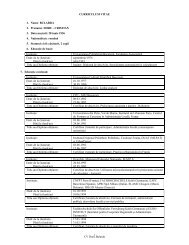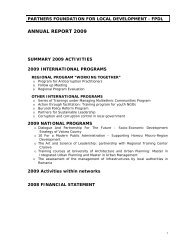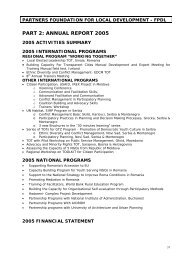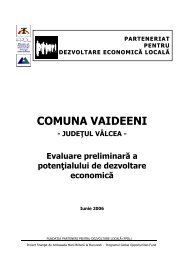Organizational Development: A Manual for Managers and ... - FPDL
Organizational Development: A Manual for Managers and ... - FPDL
Organizational Development: A Manual for Managers and ... - FPDL
You also want an ePaper? Increase the reach of your titles
YUMPU automatically turns print PDFs into web optimized ePapers that Google loves.
espect of capacity, may come through the utmost ef<strong>for</strong>ts only. Too easy training is hopeless<br />
training, in most cases.<br />
2.2. MONEY. Public officials usually do not expect to get at a restaurant a glass of “Blue Label”<br />
<strong>for</strong> the price of “Red Label”, but they often fail to take in account a relation between the price<br />
<strong>and</strong> quality of training when setting objectives <strong>for</strong> event. Training always should be of a good<br />
quality. However, trainers, materials, accommodations, meals, rooms, equipment,<br />
refreshments, recreation activities – everything costs money, <strong>and</strong> everything will influence<br />
outcomes. Less experienced colleague can not do as much as may be done <strong>for</strong> the certain<br />
time by the most professional trainer (who may charge more).<br />
There<strong>for</strong>e, the objectives should comply with the financial resources, which may be allocated to<br />
reach them. At the same time, it is very important when working with public organisations, that<br />
actual costs of training event can be easily justified by the training outcomes. Officials may be,<br />
<strong>and</strong> often are, suspicious in term of prices be<strong>for</strong>e the course. In post-socialist countries, they<br />
are used to have training free (<strong>for</strong> the account of the State budget) be<strong>for</strong>e, <strong>and</strong> they are already<br />
accustomed to have many training free now (<strong>for</strong> the account of international donors). It is a<br />
challenge <strong>for</strong> training organisations to prove the necessity of costs involved. At the end of<br />
training event, there should be no doubts, that all money spent, were spent in the most<br />
effective way. Some of training institutions, especially when financed by <strong>for</strong>eign donors try to<br />
attract officials by luxury of logistic arrangement. Officials enjoy good meals <strong>and</strong> entertainment,<br />
but pay a deep disregard later to organisers of training <strong>for</strong> the wasting of public money.<br />
3. Trainees<br />
3.1. OCCUPATION. To be successful in terms of following up organisational changes, training<br />
should be relevant to the occupation of trainees, or, from the other side – those, who have<br />
been invited to participate in training, should have relevant responsibilities <strong>and</strong> activities in<br />
local government. If the objective of training is to develop political leadership skills, then<br />
politicians should be invited. If objectives are related to per<strong>for</strong>mance management, heads<br />
of departments will be more relevant. Non-relevant trainees will be not only hopeless in<br />
implementing certain changes; they may destroy the process of training.<br />
3.2. MOTIVATION. The training process is a kind of co-operation between all counterparts<br />
(client, organisers, trainers, <strong>and</strong> trainees). This co-operation may be based on shared<br />
values <strong>and</strong> focused on certain results, or unfocused <strong>and</strong> disorganised, when each part<br />
striving <strong>for</strong> its own objectives. What client, who orders training, wants - should be attractive<br />
<strong>for</strong> those who are to be trained. It may also happen; those trainees have no direct<br />
motivation to the same outcomes of training, as organisers. Then real objectives of the<br />
199
















